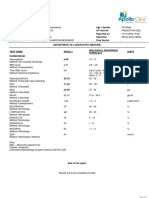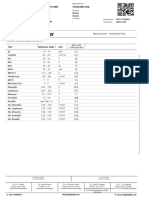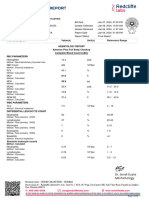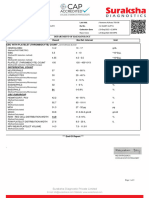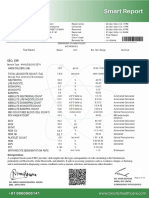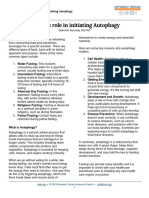68 Vishalp
68 Vishalp
Uploaded by
raj241299Copyright:
Available Formats
68 Vishalp
68 Vishalp
Uploaded by
raj241299Original Description:
Original Title
Copyright
Available Formats
Share this document
Did you find this document useful?
Is this content inappropriate?
Copyright:
Available Formats
68 Vishalp
68 Vishalp
Uploaded by
raj241299Copyright:
Available Formats
Dr.
Chhabra's Pathology Centre
e-Report 35/1, Subhash Road, Dehradun - 248001
Ph.: 2656804, 2654134, 6458445
TeleFax: 2654134
web:www.chhabraPATH.com | email: director@chhabrapath.com
Date : Sep 18, 2023 Sample Coll. : 10:53 Sep 18, 2023
Ref. No. : 2309-18068 Report Time : 12:09 Sep 18, 2023
Patient : Mr. Vishal Pandey 26 Y / M
Ref. Doctor : SELF Delivery : Counter
*18068*
HEMATOLOGY†
Investigation Result Units Bio. Reference Interval
Haemoglobin, W. Blood : 17.2 g/dL 13.0 - 17.0
Method- SLS-Hemoglobin Method
* Age Related Reference Ranges for Haemoglobin (Indian Population)
Adult Male 13.0 - 17.0 | Adult Female 11.5 - 15.0
Children |
- Days 1 - 13 18.5 `b1 5.0 | - Days 14 - 60 13.0 `b1 3.3
- 3 mths - 10 yrs 11.2 `b1 2.3 | - 11 - 15 yrs 12.0 `b1 1.0
T.L.C., W. Blood : 4800 /cu.mm 4,000 - 11,000
Method- Flow Cytometry
D L C, W. Blood
Polymorphs : 74 % 45 - 74
Lymphocytes : 23 % 16 - 45
Eosinophils : 2 % 0-5
Monocytes : 1 % 0-5
Platelet Count, W. Blood : 86 x 10³/mm³ 100 - 400
Method- Flow cytometry; verified by microscopy
Hematocrit (Hct/PCV), W. Blood : 50.4 % 37.0 - 51.0
R B C Count, W. Blood : 5.57 10^12/L 4.20 - 6.30
Method- DC Detection
MCV : 90.5 fL 76.0 - 96.0
MCH : 30.9 pg 26.0 - 32.0
MCHC : 34.1 g/dL 31.0 - 36.0
RDW : 14.0 % 0.0 - 15.0
This is a computer generated document. No signature required.
Dr. Divye Chhabra Dr. Yogita Kumar Dr.Natasha Makkar
MD(Path), MAMC MD(Path) , LHMC MD(Path)
Page 1 of 2 Gold Medalist Consultant Pathologist Consultant Pathologist
All results reach your reports through a sophisticated, bi-directionally interfaced, computerised Laboratory Information
System (LIS). Samples are barcoded on receipt & processed from primary tubes. No manual data entry used.
Dr.Chhabra's Pathology Centre
e-Report 35/1, Subhash Road, Dehradun - 248001
Ph.: 2656804, 2654134, 6458445
TeleFax: 2654134
web:www.chhabraPATH.com | email: director@chhabrapath.com
Date : Sep 18, 2023 Sample Coll. : 10:53 Sep 18, 2023
Ref. No. : 2309-18068 Report Time : 12:09 Sep 18, 2023
Patient : Mr. Vishal Pandey 26 Y / M
Ref. Doctor : SELF Delivery : Counter
*18068*
SEROLOGY & IMMUNOLOGY
Investigation Result Units Bio. Reference Interval
Dengue Serology (IgG,IgM & NS1
Ag), Serum
Dengue Virus Antibody IgG : Non-Reactive
Dengue Virus Antibody IgM : Non-Reactive
Dengue NS1 Antigen P/CO : 65.70 Ratio 0.00 - 1.00
Dengue NS1 ELISA Interpretation : POSITIVE
Method: ELISA/ ELFA Enzyme Linked Fluorescent Assay
Interpretation:
Index of Patient/ Cut-off >=1.0 - NS1 Detected
Index of Patient/ Cut-off < 1.0 - Not Detected
Dengue virus (DENV) belongs to the Flaviviridae family and is transmitted to humans by Aedes mosquitoes. DENV are divided into four
serotypes: DEN-1, DEN-2, DEN-3 and DEN-4. Clinical diagnosis of DENV infection mainly relies on nonspecific symptoms (headache,
arthralgia, myalgia, nausea, vomiting, and thrombocytopenia). Laboratory diagnosis relying on direct and/or indirect methods is used to
confirm dengue diagnosis.
During the early phase (less than 5-7 days after onset), direct diagnostic techniques, such as the identification of viral nucleic acid or NS1
antigen, are preferred. Combining NS1 detection with IgM serological assay in routine diagnosis of DENV infection can help to improve
accuracy of dengue diagnosis.4-7 After 5-7 days, serological tests, based on host immune response to virus infection (IgM and/or IgG), are
commonly used. The timing of the appearance and duration of these biomarkers depend on whether the patient is experiencing a primary or
secondary DENV infection. During primary infection, the antibody response to DENV infection with IgM is usually detectable early after the
onset of the symptoms and persists for 2-3 months; dengue IgG appear few days after IgM and persist for years. During secondary
infection, dengue IgG appear earlier and IgM have kinetics close to primary infection but at a lower level.
- The above test is a sensitive Rapid ELISA antibody detection test from PANBIO ELISA, Australia (Reagent kit endorsed in Indian Journal of
Pathology[1]). The kit is sensitive and specific to both IgG and IgM antibodies directed against Dengue arbovirus.
A reactive result for IgM antibodies indicates presence of circulationg anti-Dengue antibodies of IgM class (acute/primary infection by one of
the serotypes of dengue arbovirus). Similarly a reactive result for IgG antibodies indicates presence of circulationg anti-Dengue antibodies
of IgG class.
- Panbio dengue early rapid is a dengue NS1 antigen immunochromatographic assay.
It is the qualitative detection of NS1 antigen in serum and should be used in conjunction with other dengue serological tests. This assay
allows detection of infection prior to seroconversion. The limitation of the test is serological crossreactivity across the flavivirus group.
Clinical correlation and correlation with other laboratiry data is imperitive.
1- Baruah J, Shiv Ananda, Arun Kumar G . Incidence of dengue in a tertiary care centre- Kasturba Hospital,Manipal. Indian J Pathol
Microbiol; 49(3):462-463 Quote-` The study found Fever, headache and myalgia in nearly all IgM postive cases while rash and petechiae in
7% and 9% cases respectiely.`
--End of Report--
CBC only*,DengGM_NS1*
This is a computer generated document. No signature required.
Dr. Divye Chhabra Dr. Yogita Kumar Dr.Natasha Makkar
MD(Path), MAMC MD(Path) , LHMC MD(Path)
Page 2 of 2 Gold Medalist Consultant Pathologist Consultant Pathologist
All results reach your reports through a sophisticated, bi-directionally interfaced, computerised Laboratory Information
System (LIS). Samples are barcoded on receipt & processed from primary tubes. No manual data entry used.
You might also like
- Campbell S Physical Therapy For Children Expert Consult E Book 978 0323390187 PDFDocument2,875 pagesCampbell S Physical Therapy For Children Expert Consult E Book 978 0323390187 PDFDr. Izza WaheedNo ratings yet
- Xdue6378 2Document2 pagesXdue6378 2S Abedi50% (2)
- Mrs Anar DeviDocument14 pagesMrs Anar DeviM.DNo ratings yet
- NUR168 Project 031822Document11 pagesNUR168 Project 031822Rebecca RathburnNo ratings yet
- Epidemiological TriadDocument1 pageEpidemiological Triadako at ang exo100% (2)
- Department of Hematology: Blood C/E (Complete, CBC)Document1 pageDepartment of Hematology: Blood C/E (Complete, CBC)AlyEshhNo ratings yet
- Instrumental Methods of Drug AnalysisFrom EverandInstrumental Methods of Drug AnalysisRating: 3 out of 5 stars3/5 (3)
- DEC 2007-NPT 5-Questions and RationaleDocument19 pagesDEC 2007-NPT 5-Questions and RationaleRoy Salvador100% (5)
- Circumcision ProcedureDocument23 pagesCircumcision Procedurewinyarti100% (1)
- Polytrauma, ABC of Trauma & Its ManagementDocument33 pagesPolytrauma, ABC of Trauma & Its ManagementMongolian MutuNo ratings yet
- DR - Chhabra's Pathology Centre: E-ReportDocument6 pagesDR - Chhabra's Pathology Centre: E-ReportHimanshu KalaNo ratings yet
- Report - LESHAI LAKKAVAJJALA (240700003556)Document4 pagesReport - LESHAI LAKKAVAJJALA (240700003556)Vijay KumarNo ratings yet
- Report - S Sudha Mythili (240050007773)Document4 pagesReport - S Sudha Mythili (240050007773)saiprsd204No ratings yet
- PdfText23 03 29T07490Document9 pagesPdfText23 03 29T07490Sudhir BhardwajNo ratings yet
- Vim LeshDocument19 pagesVim Leshthe_ashish04No ratings yet
- Khadim HussainDocument1 pageKhadim Hussainarabkeysa.comNo ratings yet
- Complete Blood Picture (CBP) : Lbnagar - 87Document3 pagesComplete Blood Picture (CBP) : Lbnagar - 87likhith.dsmlNo ratings yet
- CC167Document1 pageCC167Steve BurnsNo ratings yet
- Praveen 3Document2 pagesPraveen 3vadthyap356No ratings yet
- Complete Blood Picture (CBP)Document4 pagesComplete Blood Picture (CBP)azharhussain201No ratings yet
- PdfText - 2024-03-10T130621.398Document7 pagesPdfText - 2024-03-10T130621.398kkNo ratings yet
- Report - Sagarika Behera (240150022820)Document4 pagesReport - Sagarika Behera (240150022820)manas210282No ratings yet
- Miss. BHAGYA LAXMIDocument2 pagesMiss. BHAGYA LAXMIpeetlasuresh921No ratings yet
- Comprehensive Body Lab ReportDocument18 pagesComprehensive Body Lab ReportTanvi PunjabiNo ratings yet
- Agilius Report - UnlockedDocument8 pagesAgilius Report - UnlockedSucharit NarangNo ratings yet
- RedCliffe Collection Center (A)Document3 pagesRedCliffe Collection Center (A)jayesh TalmaleNo ratings yet
- Lab - Report - BHAVISHKA JIDocument4 pagesLab - Report - BHAVISHKA JIYogeshKumarLoharNo ratings yet
- Department of Hematology: Blood C/E (Complete, CBC)Document1 pageDepartment of Hematology: Blood C/E (Complete, CBC)Ilyas FaizNo ratings yet
- PatientreportviewinpdfDocument1 pagePatientreportviewinpdfSaba WaheedNo ratings yet
- Mr. Bimalendu ChakrabortyDocument2 pagesMr. Bimalendu Chakrabortyindranil chattapadhyayNo ratings yet
- Screenshot 2024-04-03 at 10.12.42Document5 pagesScreenshot 2024-04-03 at 10.12.42Rajendra DagaonkarNo ratings yet
- Rajkumar HerDocument1 pageRajkumar HerRajkumar SontakkeNo ratings yet
- Final: Code/Name & AddressDocument19 pagesFinal: Code/Name & AddressSUNSHINE DIAGNOSTICSNo ratings yet
- Final: Code/Name & AddressDocument11 pagesFinal: Code/Name & AddressSahilNo ratings yet
- ReportDocument3 pagesReportসালমান সাব্বিরNo ratings yet
- Report ViewerDocument2 pagesReport Viewersufyan rasoolNo ratings yet
- Department of Hematology: Blood C/E (Complete, CBC)Document1 pageDepartment of Hematology: Blood C/E (Complete, CBC)umer azizNo ratings yet
- Uk125 2425 000177Document5 pagesUk125 2425 000177shekharkumarkashyap07No ratings yet
- MR Santosh Rai: Method: CalculatedDocument10 pagesMR Santosh Rai: Method: CalculatedSantosh RaiNo ratings yet
- Report - SUMATHI (230380015090)Document5 pagesReport - SUMATHI (230380015090)anumolusumathiNo ratings yet
- HeaderDocument13 pagesHeaderRoshan Virat PandeyNo ratings yet
- 11942-22122001-8 - SADIA NOOR - Laboratory ReportDocument1 page11942-22122001-8 - SADIA NOOR - Laboratory ReportASAD ALINo ratings yet
- Complete Blood Count: Ms. Nuveriya MujavarDocument1 pageComplete Blood Count: Ms. Nuveriya Mujavargagowol126No ratings yet
- $14012024$346068 18 1 NondescriptiveDocument5 pages$14012024$346068 18 1 NondescriptivePrabin MallickNo ratings yet
- Final: Code/Name & AddressDocument10 pagesFinal: Code/Name & AddressAjay YadavNo ratings yet
- DownloadDocument3 pagesDownloadAnushkaNo ratings yet
- FrmPatientViewAllReport - 2023-03-23T181412.229Document7 pagesFrmPatientViewAllReport - 2023-03-23T181412.229Abhishek KumarNo ratings yet
- Final: Code/Name & AddressDocument6 pagesFinal: Code/Name & AddresscrypticgarvNo ratings yet
- Uk125 2324 000857Document6 pagesUk125 2324 000857shekharkashyapytambariNo ratings yet
- Issued To:: 10-Mar-2024 08:19 29 YearsDocument5 pagesIssued To:: 10-Mar-2024 08:19 29 YearsharshitakoutaNo ratings yet
- 0afc33cc Aee6 11ee A7f8 7c1e520e223c HeaderDocument21 pages0afc33cc Aee6 11ee A7f8 7c1e520e223c Headerpparmar871No ratings yet
- 3d Report 26:02:2024Document7 pages3d Report 26:02:2024sqz72yysjgNo ratings yet
- ReportDocument19 pagesReportpparmar871No ratings yet
- Pathology 22.04.2020 02.46.58.984Document1 pagePathology 22.04.2020 02.46.58.984Small WondersNo ratings yet
- ReportDocument2 pagesReportdarsheel SinghNo ratings yet
- Report 2402410522 1Document4 pagesReport 2402410522 1ahad siddiquiNo ratings yet
- SR8188385Document2 pagesSR8188385mohanchowdhury1948No ratings yet
- Labreportnew (8) - 3Document11 pagesLabreportnew (8) - 3Rocky JNo ratings yet
- Uk125 2425 000110Document5 pagesUk125 2425 000110shekharkumarkashyap07No ratings yet
- Method: Calculated: Page 1 of 7 15-Jun-2022 01:22 PMDocument8 pagesMethod: Calculated: Page 1 of 7 15-Jun-2022 01:22 PMgunjan pratapNo ratings yet
- ReportDocument13 pagesReportAbhilashNo ratings yet
- 7543 LabReportDocument1 page7543 LabReportAli AhmadNo ratings yet
- Complete Haemogram (Hemogram & Esr) Haemoglobin Total RBC CountDocument5 pagesComplete Haemogram (Hemogram & Esr) Haemoglobin Total RBC Countrohit bharadwazNo ratings yet
- ReportDocument12 pagesReportSimran jeet kaurNo ratings yet
- PR 0684689Document4 pagesPR 0684689Nachiketa BiswalNo ratings yet
- Mrs - VERKHA SHARMA - 32Document6 pagesMrs - VERKHA SHARMA - 32PRAYAG RAJ TYAGINo ratings yet
- CT Week 7Document21 pagesCT Week 7Eh paano kung HindiNo ratings yet
- Study Case J&JDocument7 pagesStudy Case J&J-Lia Citra Candra-No ratings yet
- Prevention of MSKDocument14 pagesPrevention of MSKArham ShamsiNo ratings yet
- 4.ISCA IRJMedS 2016 024Document7 pages4.ISCA IRJMedS 2016 024danielwikwatyo701No ratings yet
- 4.2.2 Risk Factors of Breast Cancer Among Women A Meta AnalysisDocument15 pages4.2.2 Risk Factors of Breast Cancer Among Women A Meta AnalysisNoob KidNo ratings yet
- Altered Passive Eruption, The Gummy SmileDocument12 pagesAltered Passive Eruption, The Gummy SmileCinthia Castro100% (1)
- Fellowship in Critical Care MedicineDocument12 pagesFellowship in Critical Care MedicinerajiNo ratings yet
- Pricelist Poliklinik Kecantikan Klinik Dahayu MedikaDocument9 pagesPricelist Poliklinik Kecantikan Klinik Dahayu MedikaAini AjizahNo ratings yet
- Essentials of Pathophysiology Concepts of Altered Health States 3rd Edition Porth Test BankDocument6 pagesEssentials of Pathophysiology Concepts of Altered Health States 3rd Edition Porth Test Banktotalizekaolinew8ho3100% (32)
- Standard Precautions 1Document34 pagesStandard Precautions 1Melody LandichoNo ratings yet
- Formative Test Gus 2014 TWPDocument21 pagesFormative Test Gus 2014 TWPelka rifqahNo ratings yet
- Freiburg 2015 Preliminary ProgramDocument18 pagesFreiburg 2015 Preliminary ProgramAdelina HorhatNo ratings yet
- Encephalitis and Aseptic Meningitis: Short-Term and Long-Term Outcome, Quality of Life and Neuropsychological FunctioningDocument9 pagesEncephalitis and Aseptic Meningitis: Short-Term and Long-Term Outcome, Quality of Life and Neuropsychological FunctioningRoberto SoehartonoNo ratings yet
- Urinary Tract InfectionsDocument3 pagesUrinary Tract InfectionsBimbi ZulkifliNo ratings yet
- GenogramDocument10 pagesGenogrammohamadNo ratings yet
- NP 5Document26 pagesNP 5Allaiza CristilleNo ratings yet
- Lecture 3, Principles of Cavity Preparation IDocument23 pagesLecture 3, Principles of Cavity Preparation IJustDen09100% (4)
- Hand WashingDocument23 pagesHand WashingvijayalakshmiNo ratings yet
- Fasting and AutophagyDocument2 pagesFasting and AutophagyfrancoNo ratings yet
- Drugs Use in Respiratory DisordersDocument43 pagesDrugs Use in Respiratory DisordersSri RamNo ratings yet
- 7-A CengcengDocument11 pages7-A CengcengBela RonaldoeNo ratings yet
- Cluster BDocument3 pagesCluster BMegNo ratings yet
- Liver Transplantation, Easl Clinical Practice Guidelines 2015 PDFDocument53 pagesLiver Transplantation, Easl Clinical Practice Guidelines 2015 PDFMadalina StoicescuNo ratings yet
- Asthma GERDDocument1 pageAsthma GERDBurak FenercioğluNo ratings yet





























